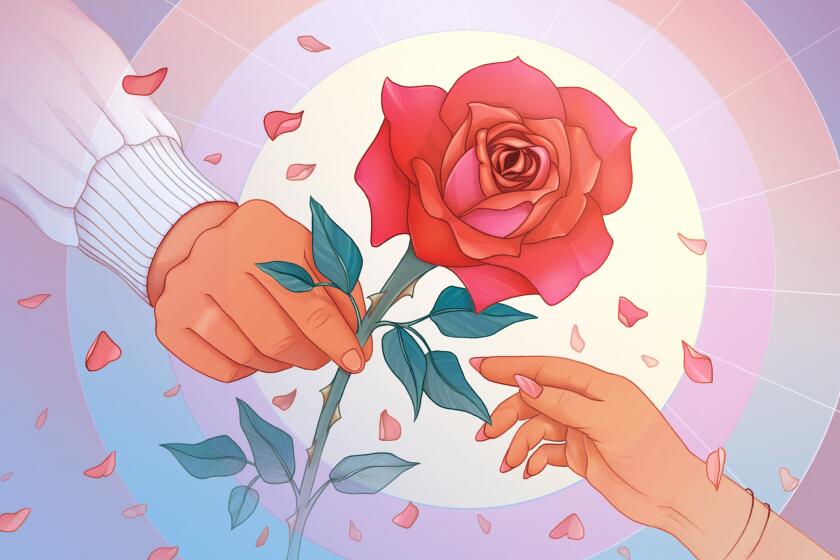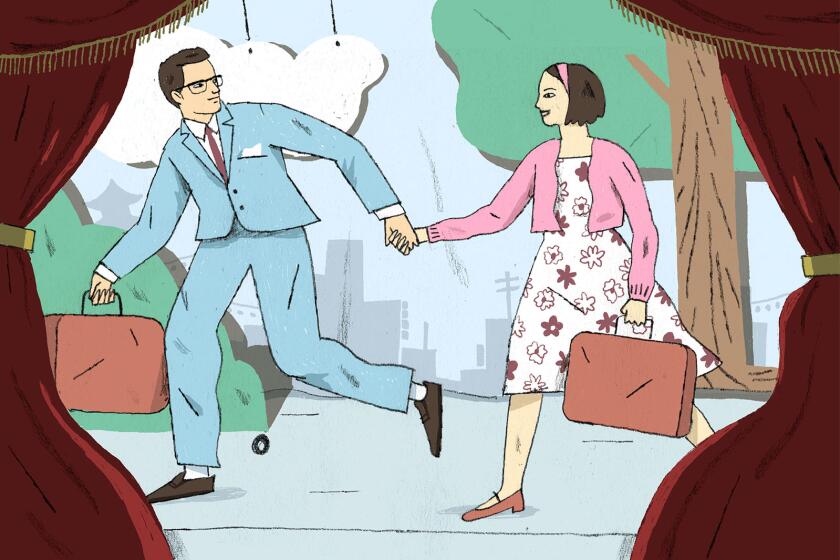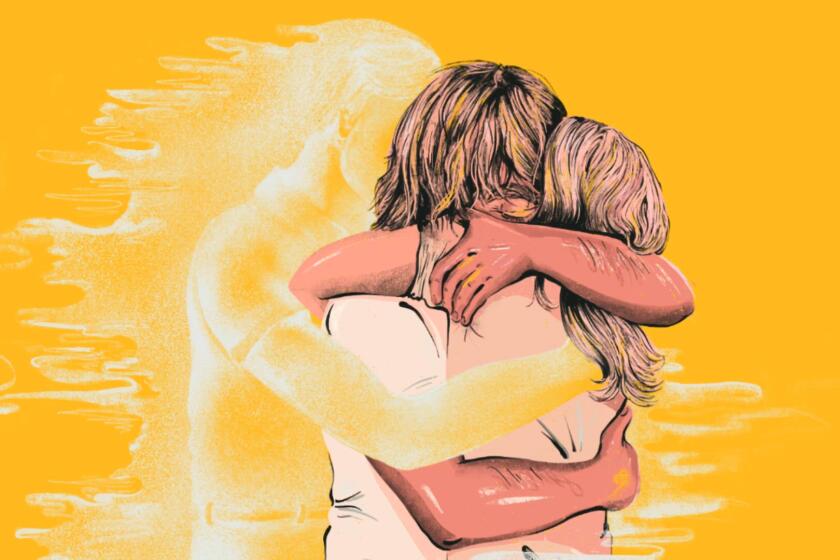L.A. Affairs: Enough with the perfect Instagram weddings. But how could I make mine special?
- Share via
When my partner Daniel and I reached our late 20s, our social lives became attending other people’s weddings.
Another Friday night, another welcome party: his and hers signature cocktails, best friend’s toast about embarrassing high school shenanigans and Caprese skewers at the buffet. On Saturday evening came the parade of coordinated bridesmaids; the couple’s vows (he is her rock, she’s made him a better man); the first dance followed by the father-daughter dance; cake-cutting; and the playing of “Celebration” by Kool & the Gang. On Monday morning, the bride’s Instagram post, featuring a black-and-white portrait of the happy couple, confirmed it.
Ta-da: married.
Over and over, we saw the same unoriginal, impersonal show.
We cooked Bolognese sauce, wrote songs together and continued talking about the meaning of life. Could this relationship last?
When it came to our engagement and wedding, I was determined not to re-create these trappings. I wanted our marriage and the hoopla around it to feel personal, modern, authentic.
So pre-proposal, I laid out three requirements for Daniel: 1. Sapphire instead of diamond. 2. No kneeling. (Let’s start this thing on equal footing, shall we?) 3. We had to do something about his left ring finger because I wasn’t going to walk around like branded cattle while he hobnobbed about as an ostensible bachelor.
The moment finally came on a hike in the San Gabriel Mountains on a Saturday morning. It was a sapphire. He stood. Later that week, we went to get his left ring finger tattooed. I felt like me; we felt like us. So unique, right?
Of course not.
I waited. He asked. I got jewelry for that finger. Neither Pinterest nor the patriarchy quaked in its boots. Here we were: another couple on another hike with another ring.
Ta-da: engaged.
But I hadn’t given up yet. I was determined to plan a wedding that didn’t mindlessly adhere to patriarchal convention or Instagramability.
The dress felt like the easiest place to start. I liked the idea of blue or green, maybe something with a pattern. But when my mother, sister and I arrived at our first appointment, we were met with a mob of tulle and sparkle, sweetheart necklines and tea-length hems, and white, white, white.
Being a straightforward person, I wanted to know if the chef wanted to come back to my hotel. The next day I asked him if he’d be back for Round 2.
Before I knew it, I was standing on a pedestal surrounded by mirrors. The curtain was whipped closed by my stylist, and by the time I had silently concluded that I hated all gowns and, come to think of it, despised the color white on anything — cakes, clouds, printer paper — she had zipped me up, clamped the dress to size, turned me toward the mirror and pulled the curtain open.
There I was.
A bride.
“Oh my God,” I said.
I had transformed. I was my mother in the wedding photo my father keeps on his dresser. I was Sleeping Beauty, and JLo in “The Wedding Planner.” I was Grace Kelly and that nameless bride in the antique store daguerreotype and every woman who has ever been married wearing anything at all.
For a moment, I forgot about being me. I relished the idea that I looked like somebody else. Somebody doing that thing. Somebody getting married.
A few months later, my grandparents threw a 65th-anniversary party. Nana and Grandpa are the world’s cutest couple, and the party reflected it. Guests wept as my grandfather lifted my wheelchair-bound grandmother to her feet and swayed her to the song that was their first dance: “On the Street Where You Live” from “My Fair Lady.”
On the way out of the party, I looked at the photo they’d propped by the door. There was my grandfather with his ink-black hair. There was my grandmother holding her bouquet, veil draped over her white gown. It wasn’t inspired by Pinterest, and it would never see an Instagram grid. But it was the same thing that every couple after every ceremony every weekend gets too: their wedding photo.
I was attending college when a lonely Mr. C asked me to dinner as a thank-you for taking care of his children.
And in that moment, I wanted an exact replica. Put me on the church steps and drape me in a veil. Snap it, frame it and call it a union. Because how else could I explain this thing we’re doing? What original language can be put to the decision to spend the rest of my life legally, spiritually and emotionally intertwined with another human?
I realized then, and came to embrace over months of planning, what the cookie-cutter wedding was all about. Although I kept my foot down on the more overtly sexist aspects, I stopped resisting the feeling that I was unoriginal and a copycat and started to see the beauty in repetition.
Proposals, aisles, first dances, tiered cakes? Yes, they are hackneyed and tired. But they’re also the most precise way we have to say, “Hey. You know that thing? That stupid, inexplicable, magical thing — marriage? We’re doing that.” It’s a funny language for such lofty, ineffable ideas, but it gets the message across: We’re part of a timeless tradition of something that can’t be described in words.
I keep calling Scott, a man I loved so completely I felt whole, by my ex’s name, Paul. Is there a deeper meaning behind my slipups?
Daniel and I got married last May. We didn’t have matching bridesmaids, and I don’t think I used the word “rock.” But my dress was as white as the cake. We ate our Caprese skewers with abandon. We had a first dance, a father-daughter dance and a mother-son dance for good measure. And obviously, the band played “Celebration.”
So did we do what everyone else did? Yes. And ... so what? Of all the things to emulate, to copy and paste from the internet, eternal love seems like a pretty good option.
The author is a writer, editor and singer-songwriter from St. Louis. Her short fiction has been published in Narrative, Ninth Letter and Epoch, among others. She is the editor of december, a literary magazine. She also just completed her debut novel. She lives in Long Beach and is on Instagram: @isabellestillman
L.A. Affairs chronicles the search for romantic love in all its glorious expressions in the L.A. area, and we want to hear your true story. We pay $400 for a published essay. Email LAAffairs@latimes.com. You can find submission guidelines here. You can find past columns here.
More to Read
Sign up for The Wild
We’ll help you find the best places to hike, bike and run, as well as the perfect silent spots for meditation and yoga.
You may occasionally receive promotional content from the Los Angeles Times.














